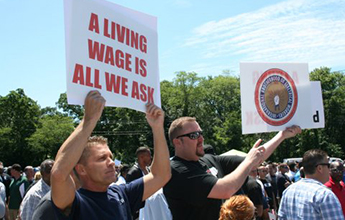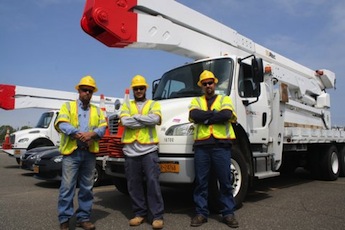
Strike Averted:
|
 |
| Jamaica, N.Y., Local 589 members rally ahead of what was expected to be a July 21 strike for fair wages and benefits. Employees had been without a contract since 2010.
|
After four years with no raises and stymied negotiations, 5,400 workers had resolved to walk off the job after employer Metropolitan Transit Authority refused to negotiate a fair contract in one of the most expensive regions to live in across the U.S.
Jamaica, N.Y., Local 589 General Chairman Ricardo Sanchez, who was active in negotiations, called the agreement a win for middle-class workers who maintain complex infrastructure.
“It feels good to have this process completed,” said Sanchez, who leads the local representing more than 800 electricians at the LIRR. The IBEW is in a bargaining coalition with seven other unions at the railroad.
The unions agreed to a 17 percent wage increase over six-and-a-half years and a 2 percent contribution toward health care costs. Other tenets of the agreement include a modest increase in worker pay toward pensions and a longer period for new hires to reach the top-tier pay grade. The contract is retroactive to 2010 and expires December 16, 2016.
Despite some concessions, Sanchez said members “were big winners” when compared to the draconian cuts the MTA had sought to impose during years of discussions.
“They had tried to force us to pay double for our health care and wanted steep retirement contributions – but we took all that off the table,” Sanchez said.
Employees already pay 4 percent into their pension for their first ten years of employment, before being able to collect benefits upon retirement. LIRR sought to mandate a 5.2 percent lifetime contribution. The two parties instead settled on a 4 percent contribution for 15 years.
A strike had seemed inevitable earlier in the week, with both sides far apart on issues. N.Y. Gov. Andrew Cuomo stepped in June 16 for a marathon bargaining session that helped broker a deal that looks certain to be ratified by the union members, Sanchez said. The agreement staved off what would have been the first strike at LIRR in more than 20 years.
Cuomo, who in April helped negotiate a deal between the city management and subway and bus operators, called the LIRR agreement “a compromise by both parties,” the New York Times reported.
The Metropolitan Transit Authority said on its website that the contract will have no impact on LIRR fares.
 |
| More than 800 members of Local 589 maintain infrastructure for the Long Island Railroad, the busiest commuter rail system in the nation.
|
Since 2010, the MTA refused to move from its demand to dramatically slash pay and benefits for new employees. Labor leaders said the result of these proposed changes would be to hurt the LIRR’s ability to attract and retain qualified electricians and other skilled workers.
Two presidential emergency boards, convened at the MTA’s request in 2013 and 2014, sided with the unions, saying labor’s proposal was the most reasonable. Still, the MTA rejected the board’s findings.
Sanchez said LIRR management tried to take advantage of the recent recession to force concessions from the workforce while engaging in a media smear campaign. “They distorted who we are in the press, painting us as overpaid and greedy,” he said.
That familiar characterization – popular with anti-worker politicians and major corporations – caught fire amongst many commuters, evidenced by news reports in a slew of popular New York publications.
“The irony was that in reality, we weren’t the problem,” Sanchez said. “I would talk with newspapers and tell them, look, Monday you write about the declining middle class, Tuesday you write about income inequality, but Wednesday you write about greedy unions? There was a big disconnect between who we are – skilled middle-class workers – and who some people thought we were, as portrayed by management and some media. All the while, it’s getting harder and harder to be middle class in and around Long Island. Workers are getting hit hard.”
IBEW International President Edwin D. Hill praised the efforts of negotiators and said that he is glad the crisis has been averted.
“Our members expertly service the most demanding transit system in the country – and for that work, they deserve fair compensation and treatment,” he said. “I’m glad that our members can now get back to doing what they do best, and I wish discussions did not have to come to this point in order to get a decent agreement.”
Sanchez agreed, saying that the harsh tactics that had demoralized and frustrated workers for years finally culminated in a growing resolve to stand up for fair treatment. “Our success was a combination of factors – the leadership of the locals, and rank-and-file members who believed in the process. At the end of the day, MTA understood that all the unions were united and we weren’t bluffing. Nobody wants to go on strike if it can be avoided. If management had given us a different proposal earlier, this might have gone differently.”
For now, Sanchez said it’s “all smiles” at the Local 589 hall, as members are eager to get back on the job.
“Everybody’s happier now – employees, management, and the public,” he said. “Standing together, we helped deliver a fair outcome.”
Read more at Local 589’s website.
Homepage photo credit: Photo used under a Creative Commons License from Flickr user Metropolitan Transportation Authority of the State of New York.
![]()